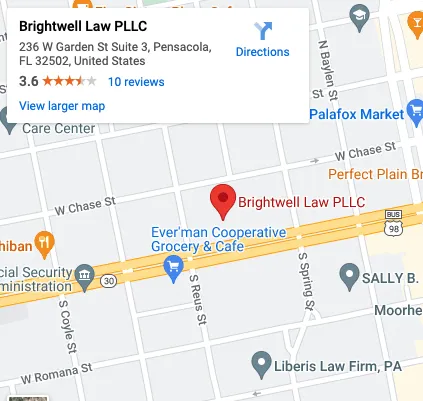Pensacola Guardianship Attorney
A Pensacola guardianship attorney specializes in providing legal guidance and representation for individuals seeking to establish guardianship for a loved one. At Brightwell Law PLLC, our Pensacola guardianship lawyer provides compassionate and knowledgeable assistance throughout the entire guardianship process. We want to help you navigate the guardianship process smoothly and ensure the best interests of the ward are protected.
Whether you’re in need of expert advice for establishing guardianship, navigating complex legal matters, or safeguarding the well-being of a vulnerable individual, our team is fully prepared to offer you comprehensive and practical guidance. We prioritize your peace of mind. Allow us to navigate you through the guardianship process with the utmost care and unwavering dedication you deserve.
What is guardianship?
In Florida, a guardianship is a legal arrangement where the court appoints a surrogate decision-maker (known as the guardian) for minors or adults with disabilities (known as the ward). The guardian is responsible for making personal and/or financial decisions that are in the best interests of the ward.
How is guardianship different from power of attorney?
A power of attorney (POA) and guardianship have different roles but share a common goal: enabling someone to make decisions for someone who cannot do so themselves. The crucial difference lies in when and how they are made.
The person who wants to appoint someone who can make specific decisions for them establishes a power-of-attorney. In a POA, the would-be ward is still capable of sound decision-making at the time the POA is created.
On the other hand, a guardianship is only established when the ward is already considered incapacitated or unable to make decisions for themselves. Instead of the ward appointing the guardian themselves, the Florida court will select and appoint a guardian for the ward.
How long does guardianship last in Florida?
Terminating Minor Guardianships: In most cases, guardianships for minors end when the ward turns 18. Depending on the individual’s circumstances, this guardianship journey may have different timelines and processes.
Terminating Adult Guardianships: These guardianships typically remain in effect until the adult ward regains their capacity. To conclude an adult’s guardianship, the ward must present a formal request known as the “Petition to Terminate Guardianship” to the court. This petition aims to demonstrate to the court that the ward can now make sensible decisions due to regained capacity.
Terminating temporary guardianships: For temporary guardianships, these automatically come to an end after 90 days in most cases.
What are the different kinds of guardians?
Most guardianship situations can be grouped into these categories:
Guardian of the Person
Guardianship of a person is a more involved and complex type of guardianship compared to taking care of their property. When a person is determined to be incapable by mental health experts or the law, the state assigns a guardian who will supervise and make significant life choices for the individual until their incapacity changes.
The guardian handles vital decisions affecting the person, like where they live, whom they interact with, the medical care they receive, their social activities, and travel arrangements. Guardians must provide yearly updates to the court, informing the court about the individual’s condition and well-being.
Guardian of the Property
The guardian in charge of the ward’s property collects and manages the ward’s belongings. This includes things like bank accounts, stocks, and real estate. The guardian must create a list of these belongings and confirm that it’s correct and complete.
The belongings are put under the guardian’s name, and the guardian’s role is to ensure they are kept safe and used appropriately for the ward’s benefit. Every year, the guardian must provide reports to the court showing the status of the belongings.
These reports need the court’s agreement. Apart from handling the ward’s belongings, the guardian in charge of the property can also take legal action on behalf of or against the ward. This guardian has specific abilities they can use without asking the court and other abilities that need the court’s permission.
Guardian of the Person or Property
In some situations, only guardianship for the handling of property becomes necessary. For instance, if a minor is set to inherit property worth more than $15,000, even if a parent is alive, a guardian is needed to safeguard the minor’s belongings. Occasionally, an adult might have plans that make guardianship for personal matters unnecessary, like having a healthcare surrogate.
However, they might only possess assets in their name and need help managing them. A common case where only personal guardianship is required involves individuals who have prepared legal documents that eliminate the need for full guardianship. The most frequent instance is a “living trust.” Through a trust, assets are transferred, and trustees are designated to take over.
This way, the need for property guardianship is reduced. If a personal guardian is appointed in this scenario, they collaborate with the trustee to ensure the ward’s well-being. The guardian assesses living arrangements and costs, and the trustee covers these expenses using the trust’s resources.
Guardian Advocacy
Guardian advocacy is a unique form of guardianship created for individuals with developmental disabilities once they reach 18 years old. It’s a simplified process designed specifically for this situation.
What are the two types of guardianships?
Plenary Guardianship
In a plenary guardianship arrangement, the guardian receives all the transferable rights, and the person in their care retains none.
Limited Guardianship
In limited guardianship, the guardian is granted certain rights, while the person being looked after keeps some rights for themselves. For instance, in limited guardianship, the person might choose to keep the right to decide where they live. Still, they might give up the ability to get married or make contracts.
Emergency Guardianship
In urgent scenarios necessitating rapid decision-making for someone incapacitated, there’s a process to temporarily designate a guardian. This action grants the authority to make critical choices on behalf of the incapacitated person. The court must conclude that there’s a looming “imminent danger.”
This implies that the individual’s physical and mental well-being or safety could face harm due to delay. Alternatively, suppose the person’s assets are at risk of being wasted or misused without immediate intervention from the court. In that case, the emergency temporary guardian (ETG) is authorized to act in the best interest of the incapacitated individual for up to 90 days.
How do I establish guardianship in Florida?
For clear reasons, declaring someone legally unable to manage their own life and removing their control is not simple. Before a court decides incapacity, various steps must be followed, and evidence needs to be provided. This is to ensure that the judge can make a well-informed choice.
When there’s a belief that an adult cannot make decisions or care for themselves, the guardianship process unfolds in the following way:
Step 1: Submit a petition to determine incapacity.
An adult, often a family member, submits a request to the court to decide on an individual’s incapacity.
Step 2: The court-appointed committee evaluates the petition and assesses the ward.
Upon filing the request, a judge chooses a committee of three evaluators to assess the person’s condition. This group usually includes two doctors and someone with specialized knowledge of a specific incapacity.
Step 3: Attend the scheduled court hearing to determine the extent of the incapacity.
The judge will appoint a Pensacola guardianship attorney to represent the person who might be incapable. However, this person can choose their lawyer instead.
The committee members evaluate the individual, typically involving physical and mental health assessments and functional evaluations.
Each committee member reports to the court with their findings and conclusions.
If two of the three committee members decide the person isn’t incapacitated, the court dismisses the request.
Conversely, most members of the committee find the person unable to exercise certain rights. In that case, a court hearing is scheduled to determine the extent of the incapacity.
Step 4: Appoint the guardian during the court hearing.
If incapacity is determined, a guardian is appointed during the hearing. Unless there are less restrictive options available to address the incapacity and protect the individual’s interests,
Why do I need a guardianship attorney in Florida?
Navigating the complexities of guardianship laws in Florida can be daunting, which is why you need a knowledgeable Florida guardianship lawyer by your side.
- Legal Experience: Our skilled Pensacola guardianship attorney understands the intricate and varying guardianship laws and can guide you through the process, ensuring compliance with all legal requirements.
- Court Procedures: We have a deep understanding of the court proceedings, documentation, and legal filings involved in establishing guardianship. We can help you navigate the paperwork efficiently and meet all deadlines.
- Best Interests of the Ward: Our legal team prioritizes the well-being of the ward. We take the time to understand your unique situation and advocate for decisions that align with the ward’s best interests, providing a voice for those unable to express their preferences.
- Avoiding Mistakes: Our skilled estate planning attorney helps you avoid legal errors or oversights that could lead to delays, complications, or the denial of guardianship. We guide you towards a smoother and successful outcome.
- Court Representation: In case of disagreements or objections during guardianship proceedings, our trusted guardianship attorney provides professional representation in court, safeguarding your interests and presenting your case effectively.
- Tailored Legal Advice: We offer personalized advice based on our experience. We can provide insights into alternatives to guardianship, such as durable powers of attorney or advance directives, which may be more suitable for specific situations.
- Complex Circumstances: If your case involves intricate family dynamics, substantial assets, or complex medical needs, we can help you navigate these complexities and make informed decisions.
Call our experienced Pensacola guardianship attorney!
Brightwell Law PLLC is your steadfast partner in traversing the intricate landscape of guardianship in Florida. Our adept guardianship attorney in Pensacola brings years of experience and a profound commitment to your peace of mind, ensuring that your loved ones’ well-being remains the top priority throughout the guardianship process.
With a deep understanding of the state’s guardianship laws and a passion for delivering personalized solutions, we are here to guide you with clarity and empathy. At Brightwell Law PLLC, we believe in simplifying complex legal matters to offer you a smoother journey. Our legal team is dedicated to transforming challenges into opportunities, offering unwavering support as you seek to secure the future of those who matter most.
With Brightwell Law PLLC by your side, you can confidently navigate guardianship matters, knowing you have a trusted ally ready to champion your needs and protect your family’s interests. We can also assist you with creating an estate plan, addressing legal family issues, dealing with landlord-tenant concerns, and resolving probate matters. Let us guide you toward a brighter and more secure future.


